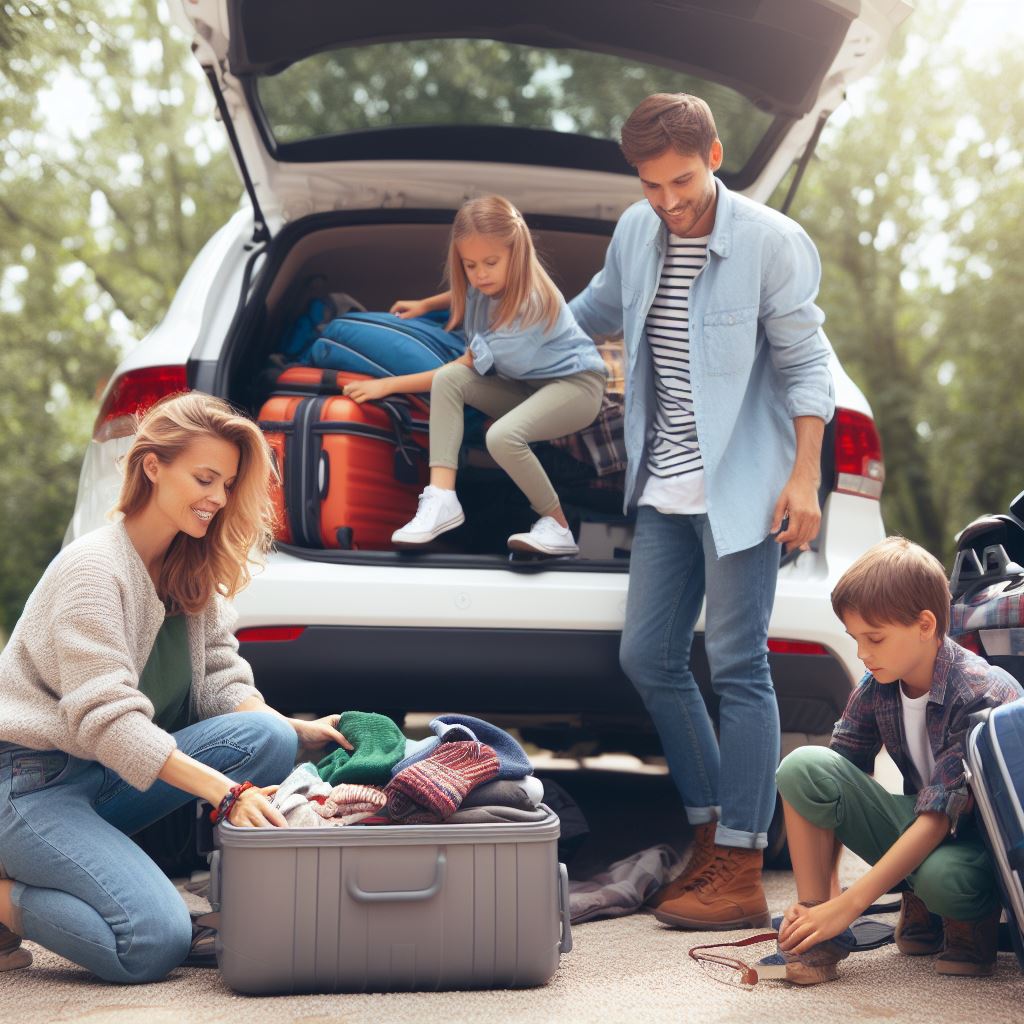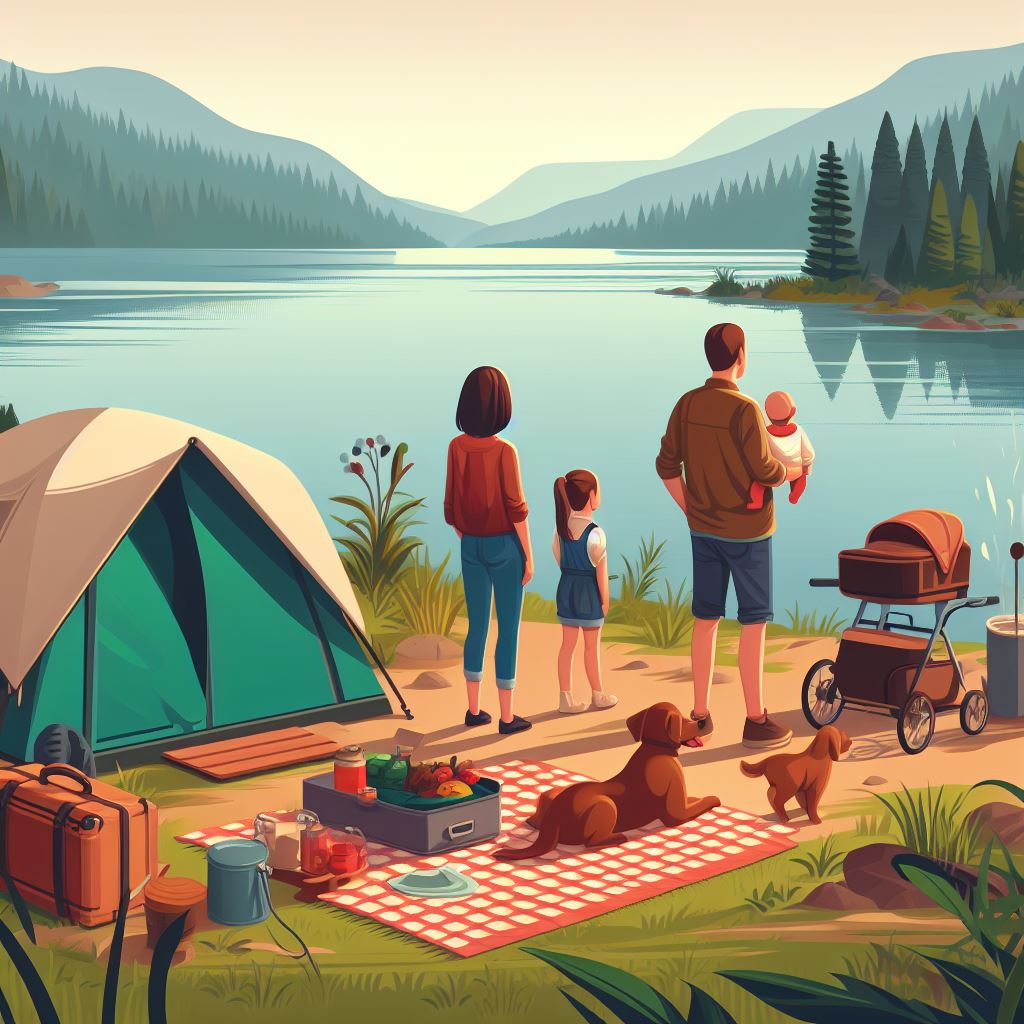From the tranquility of the early morning sunrise to the captivating display of starlit skies, camping presents an unrivaled opportunity to connect with nature. While embarking on this adventure with your baby might seem daunting, with meticulous planning and preparation, it can transform into a memorable experience. This comprehensive guide aims to equip new parents with all the essentials for a successful camping trip with their little one, from understanding the challenges to packing the right gear.

Understanding the Challenges of Camping With a Baby
Camping with a baby brings its own set of challenges and concerns. Babies have their own needs and rhythms, which can be disrupted by the unfamiliar environment, fluctuating temperatures, and the absence of common comforts.
Tent or RV Camping?
The first decision you’ll need to make is whether to go tent camping or RV camping. Tent camping brings you closer to nature, but it might require more preparation in terms of baby-proofing and comfort. On the other hand, RV camping provides more amenities and safety features but might be more expensive and less rustic.
Choosing a Camping Destination
Choosing the right camping destination when you’re bringing a baby along involves more consideration than simply deciding on a beautiful location. Here are some key things you should consider to ensure that your camping trip is baby-friendly and enjoyable for everyone:
Proximity and Ease of Access
When traveling with a baby, accessibility is a key consideration. Choose a campground that’s not too far from home for your first few trips. Long drives can be challenging for little ones, and being closer to home gives you an easy out if things don’t go as planned.
Also consider the actual journey to the camping spot itself – a location that requires a long hike to reach might not be the best choice when you have a baby and all the necessary gear in tow.
Baby Friendly Amenities
Look for campsites with good amenities. This doesn’t necessarily mean you need a location with full Wi-Fi and electricity hookups, but some level of facilities can make your trip more comfortable. A site with clean restrooms, potable water sources, and even laundry facilities can be incredibly useful when camping with a baby.
Having a playground or a safe, open space for your baby to play can also be a plus.
Safety
Consider the safety of the campground. Check if the campground is located near a body of water, which can pose a risk for small children. Are there dangerous animals in the area? Are campfires allowed, and if so, is there a secure way to contain them?
Activities
Check if the area has family-friendly activities. Are there easy trails for stroller hikes? Nature centers or interpretive programs can also be a fun and educational activity for the whole family.
Remember that babies have a different tolerance level for weather and outdoor conditions, so consider the time of year and the expected weather conditions of the places you’re considering.
Preparing for the Trip

Effective preparation is key to ensuring a smooth camping experience.
Familiarizing Your Baby with Camping Equipment
Before you head out, let your baby spend some time in the tent or RV, play with the sleeping bags, and get used to any camping-specific gear you’ll be using.
Test Run at Home
Consider a practice camping night in your backyard. This can help you understand how your baby reacts to sleeping outside and identify any potential issues or missing items.
Tips for Sleeping in a Tent
Sleeping in a tent is a unique experience that may take your baby a bit of getting used to. Here are a few tips to ensure a smoother transition:
- Create a Familiar Environment: Bring along your baby’s usual sleeping gear, like a portable crib, sleep sack, or a favorite blanket. Familiar smells and textures can help soothe them in the new environment.
- Maintain Bedtime Routines: Try to stick to your usual bedtime routine as much as possible to help signal to your baby that it’s time to sleep.
- Dress Warmly: Even during summer, nights can get chilly. Make sure your baby is warmly dressed and consider a baby-friendly sleeping bag for added warmth.
- Safety First: Ensure the tent is well-ventilated and never leave your baby unattended in the tent.
Packing List & Baby Camping Supplies
When packing, you’ll need to bring along items that are essential for the baby’s health, safety, comfort, and entertainment. Here’s a comprehensive packing list tailored for both tent and RV camping:
-
- Baby-Specific Gear:
-
- Portable crib or a baby-friendly sleeping bag: This is to ensure that your baby has a safe and comfortable place to sleep. Camping is all about improvisation, but when it comes to your baby’s sleeping arrangement, it’s safer not to compromise.
- Stroller with heavy-duty wheels or a baby carrier: A stroller can make it easier to navigate through the campground and keep your baby secure. This one from BOB Gear looks ready to take on anything. However, a baby carrier can be a life-saver when you want to go for a hike or walk on uneven terrain. It can also be used in the campsite to keep your hands free while ensuring your baby is close to you.
- Baby backpack for hiking: If you’re planning on hiking, a baby hiking backpack can be extremely helpful. I personally have the Osprey Poco pack and it is great, although make sure to go to a store and test it out. Put your little one in the pack and walk around the store for 5 minutes. If you child is not comfortable in the pack for that period of time they are most likely not going to enjoy a 3 hour hike in it.
- Feeding Supplies:
- Baby food and snacks: You’ll want to pack more food than you think you’ll need.
- Sippy cups or bottles: It’s essential to keep your baby hydrated, especially if you’re camping in a warm area.
- Portable high chair: A portable high chair is not a necessity, but it can make meal times easier and safer. My wife and I like the “Inglesina Fast Table Chair“. We use it at home and when out camping. It attaches to nearly any table but does take a minute or two to set up.
- Clothing and Comfort:
- Weather-appropriate clothing: Dressing your baby in layers is a good idea as temperatures can fluctuate dramatically when camping. It is not uncommon for temps to drop considerably at night when camping.
- Baby sun hat and sunglasses
- Comfort items, such as a favorite blanket or stuffed animal: Familiar items from home can help your baby feel secure in a new environment. A baby’s favorite blanket can help soothe him to sleep amidst the unfamiliar camping noises.
- Safety Items:
-
- Baby sunscreen and bug spray
- First-aid kit with baby-specific items
- Baby monitor: depending on your power supply you may opt for battery powered options
- Sanitation Supplies:
- Diapers and baby wipes: Nothing has changed you’ll need to pack plenty of these.
- Portable changing pad: This is especially useful for tent camping, where there may not be a clean surface for diaper changes.
- Plastic bags for dirty diapers and clothes: Pack out your trash and keep the campsite clean and odor-free.
-
-
- Baby-Specific Gear:
Each of these items serves a practical purpose and can contribute significantly to the comfort and safety of your baby during the camping trip. Being prepared can turn a potentially stressful situation into an enjoyable family adventure. But do remember, the type of camping you choose will influence what you’ll need to pack. For example, an RV provides more storage space, so you might be able to bring along more comfort items.
How to Dress Your Baby for Camping

When it comes to camping, comfort is key – and this is especially true for babies. Dress your baby in layers so that you can adjust their clothing based on the weather.
Start with a base layer made of moisture-wicking material, such as merino wool, which will keep your baby warm and dry. Avoid cotton as it can get damp and cold.
Next, add a mid-layer for insulation like a fleece jacket. Then, depending on the weather, you may want to add a waterproof or windproof outer layer.
Don’t forget about accessories! Hats, mittens, and booties are essential for keeping those tiny extremities warm during cold nights. In warmer weather, ensure your baby is wearing a sun hat and UV-protective clothing.
Remember: your baby may not be able to express discomfort verbally, so regularly check if they are too hot or too cold and adjust their clothing accordingly.
Meal Prepping for Baby While Camping
Feeding a baby while camping may seem daunting, but with a bit of planning, it doesn’t have to be. Here are some tips:
- Plan Ahead: Prepare meals and snacks beforehand when possible. Pack them in a cooler to keep them fresh.
- Keep It Simple: Opt for easy-to-prep foods that your baby already enjoys. This is not the best time to introduce new foods.
- Stay Hydrated: If you’re formula-feeding, ensure you have access to clean, safe water. Pack enough bottled water if you’re unsure about the water quality.
- Pack Baby-Friendly Utensils: Don’t forget bibs, spoons, and a portable high chair if you have one.
Things to Remember When Camping With a Baby

Safety First
Safety should be your topmost priority. Ensure your campsite is baby-proofed, removing any potential hazards within your baby’s reach. Keep a close eye on your little one around water bodies, fire pits, and when encountering wildlife.
Maintaining Your Baby’s Routine
While some disruption is inevitable, try to stick to your baby’s routine as much as possible. Keeping their feeding and sleep schedule consistent can help them feel secure and comfortable.
Exploring and Activities
Engage your baby in the camping experience. Simple activities like feeling the texture of leaves, listening to the sounds of birds, or looking at the bright stars can be an excellent learning experience.
Baby’s Health
Monitor your baby’s health closely. Watch out for any signs of discomfort, illness, or allergies. Remember, it’s always better to be cautious and seek medical help if you’re unsure about anything.
How to Protect Your Baby from the Sun, Elements, and Bugs
The great outdoors is a wonderful place for a baby to explore, but it also poses certain risks. Here’s how you can protect your baby:
- Sun Protection: Babies have sensitive skin, so keep them out of direct sunlight. Dress them in UV-protective clothing, a sun hat, and sunglasses. Use a baby-safe sunscreen on exposed skin.
- Bug Protection: Use a baby-safe bug spray and consider a mosquito net for your stroller or portable crib.
- Weather Protection: Dress your baby appropriately for the weather. In hot weather, keep them in the shade and hydrated. In cold weather, bundle them up in layers.
Remember, always monitor your baby for signs of discomfort or distress and adjust their environment as necessary.
After the Camping Trip
Post-Trip Clean-Up
Once back home, ensure all baby items are thoroughly cleaned and sanitized, especially if you’re going to store them for a while before your next camping trip.
Learning from the Experience
Reflect on your camping trip. What worked well, and what could be improved? What did your baby seem to enjoy the most? Use this insight to make your next adventure even better!
Camping with your baby opens up a world of unique experiences and priceless memories. While it demands meticulous planning, the joy of watching your little one interact with nature is well worth the effort. Happy camping!
